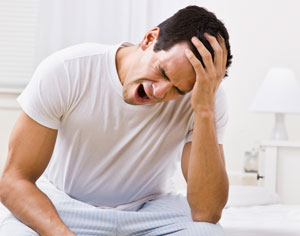The Connection Between Low Testosterone And Insomnia
There is a great connection between low testosterone and insomnia, according to multiple sources and medical professionals. Often called a vicious cycle, low testosterone can cause disturbances with sleep and not getting a full night’s slumber can cause the body to deplete its testosterone.
During the daytime, testosterone is used by the body. At night, during a restful and undisturbed sleep (REM sleep), testosterone is replenished. However, if the body does not get enough sleep, it does not restore the hormone that was used during the day and this can lead to fatigue, irritability, low sex drive and many other symptoms of a testosterone deficiency or low T.
Insomnia has also been said to cause an increase in cortisone which is the body’s stress hormone. Professionals share that high cortisone levels can deplete testosterone levels and cause sleep disturbances, such as insomnia. Many studies have proven that men with low testosterone levels have more difficulty sleeping and insomnia than men who have balanced levels of the vital hormone.
Can Low Testosterone Cause Insomnia
Sleep deprivation, such as insomnia has been proven to cause low testosterone in men. A study conducted and published in the Journal of the American Medical Association (JAMA) demonstrated the direct correlation between lack of sleep and its consequence of decreased testosterone levels.
The same study watched the sleeping habits of a group of men over one week of time. These participants were otherwise healthy men who were purposely sleep deprived for the purposes of the study. The subjects had a drop in their testosterone levels by 15 percent due to their lack of sleep. The conclusion of the study proved that testosterone levels will drop when a man has sleep disturbances or insomnia. In other words, low testosterone causes insomnia in many cases.
Insomnia ←→ Low testosterone levels
Since insomnia can cause low testosterone and low testosterone can cause insomnia, experts suggest that a person should assess if they are feeling or noticing symptoms such as:
- tiredness
- fatigue
- lethargy
- low sexual drive
- weak erections
- erectile dysfunction
- mild depression
- anxiety
- irritability
- mood swings
- agitation
- difficulty concentrating and focusing
- a decrease in strength
- weight gain (especially around the abdomen area)
- a noticeable loss of lean muscle mass
If these symptoms and others are causing problems and lowering quality of life, the person should be tested for low T. Testing consists of a simple blood sampling, along with getting a physical examination and filling out a medical history form. If testosterone levels can remain within a normal range, insomnia can be avoided, according to the experts. With the undeniable link between low testosterone levels and insomnia, more men should be tested for the condition of low T when symptoms start to arise including difficulty sleeping.
Low Testosterone Symptoms And Insomnia
When insomnia is added to the mix of other low testosterone symptoms, life can become unbearable. Without enough sleep, irritability, lack of concentration and difficulty focusing can cause an inability to perform well at work. This can lead to job termination for many men experiencing an undiagnosed and untreated testosterone deficiency.
Being aware of low testosterone symptoms and insomnia is essential for good health. When a person is familiar with what can happen to their bodies when their testosterone levels plummet, they can get early help. Being proactive can help save jobs, social relationships and personal relationships.
When sexual drive starts to disappear and the man has an inability to gain or maintain an erection, those symptoms along with sleep disturbances and insomnia are a good indicator of low testosterone levels. The number of studies proving that low testosterone symptoms and insomnia are linked is astonishing.
A research article published in Biological Psychiatry, a Journal of Psychiatric Neuroscience and Therapeutics proved that participants who were subjected to complete sleep deprivation had a definite decrease in their testosterone levels upon awakening. No other medications had an effect on how testosterone levels dipped after a complete lack of sleep during the study.
Besides helping with normal and balanced testosterone levels, sleep plays a major role in good health and happiness. Getting at least eight hours of sleep per evening can have major effects on all of the systems, organs and glands of the body, including the testes, ovaries and adrenal glands which produce testosterone.
- The relationship between sleep disorders and testosterone in men Gary Wittert Published online 2014 Jan 7




